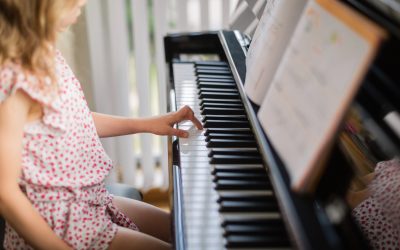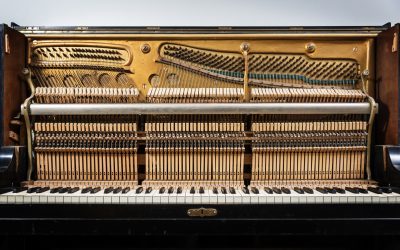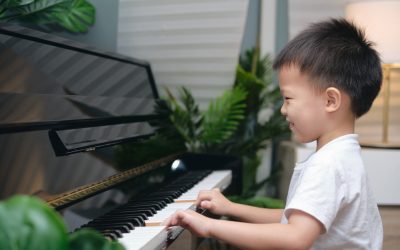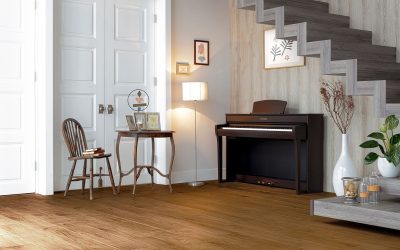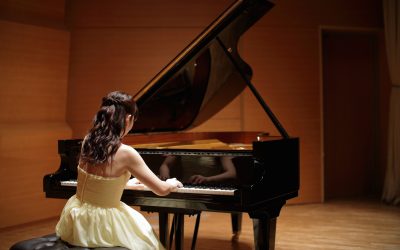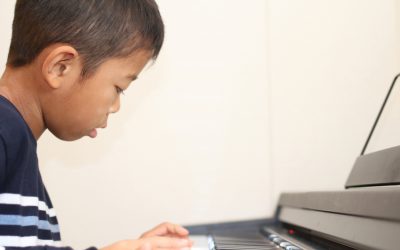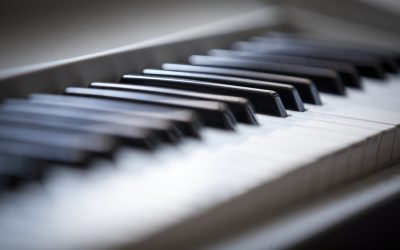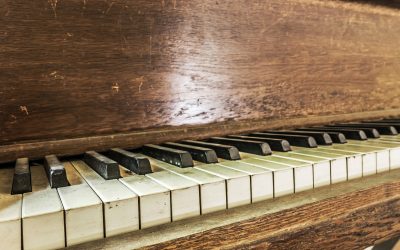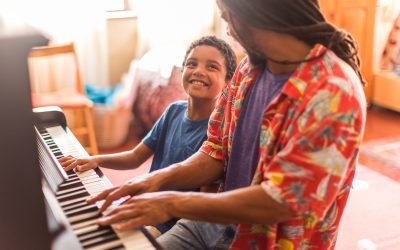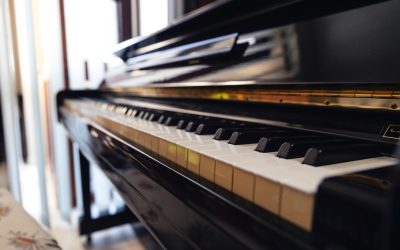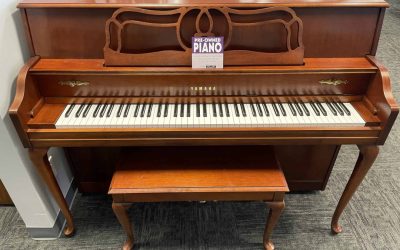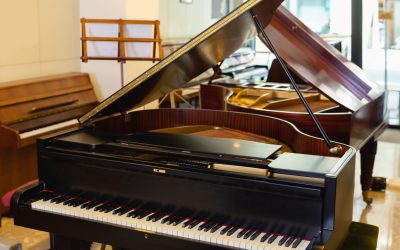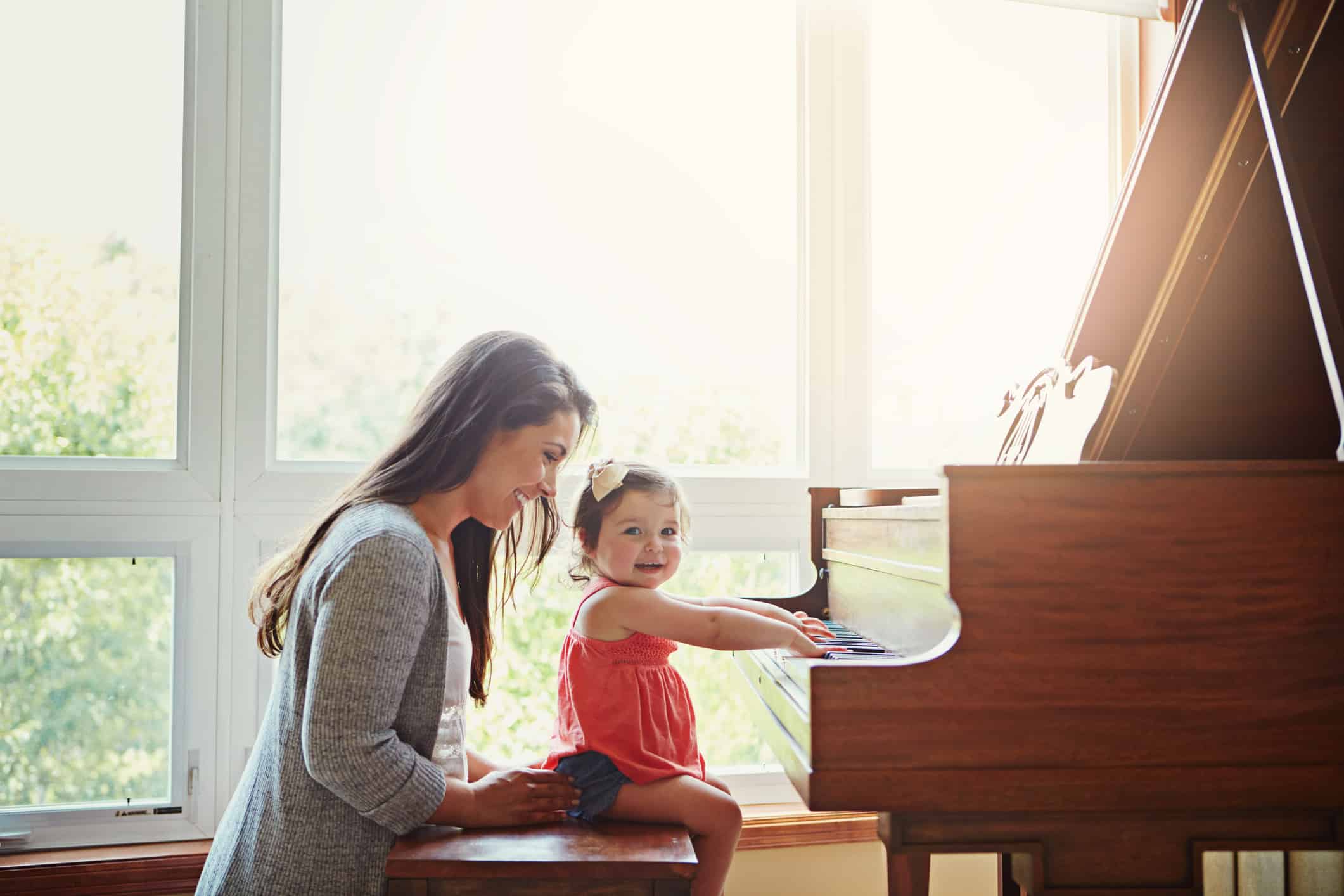
Top Benefits of Having a Piano in the Home for Kids
There are already several studies about how learning to play the piano can be beneficial to children, but what about for children in the home that are not currently taking piano lessons? For these children, as long as they are allowed to freely explore the instrument, there are several benefits they may receive from simply having a piano in the home.
Cause and Effect
One of the first things your child will test, regardless of age, is how the different notes sound–and how pushing the keys in different ways affects that sound. You’ll see toddlers starting with soft presses then getting louder as well as older children pressing quietly and slowly, then more quickly or together with other notes. For children, regardless of age, this develops a sense of cause and effect as well as encourages the experimentation connected to creative problem-solving.
Sensory Development
Sensory development is another benefit of having a piano in the home. Children’s senses develop in accordance with the sensory experiences they are exposed to. Having a piano in the home exposes them to the development of auditory skills as well as tactile.
Fine Motor Skills
The development of fine motor skills differs from gross motor skills as it includes the ability to isolate finger movements in smaller, more controlled movements. Children who explore on a piano at home, even if they aren’t yet taking piano lessons, will have opportunities to build or refine their fine motor skills as they experiment with playing with a single finger or multiple fingers at a time.
Hand-Eye Coordination
Even in early exploration stages, children benefit from having a piano in the home by developing hand-eye coordination. For an adult, pressing the center bottom of a key makes sense and doesn’t take a lot of conscious coordination. However, for a younger child, it can take more concentration to hit the intended key and to hit it in the right place to produce a sound. This hand-eye coordination is an important development in many skills they’ll build upon in the future.
Music Appreciation
Finally, having a piano in the home increases a child’s music appreciation. Having access to the instrument and experimenting with how to make music on a piano, as well as being exposed to parents or older siblings playing gives younger students an appreciation and admiration for how music is made.
Final Thoughts
As parents, we put a lot of pressure on ourselves to provide stimulation, education, and enrichment to our children. However, not every process needs to be done “perfectly” to benefit your children. If piano lessons aren’t currently a possibility or if your child is still too young to learn to read sheet music, even just having a piano in the home and being able to experiment with it can provide some excellent benefits to your child.
You may also be interested in...
Encouraging Yourself to Play Piano More as an Adult
Playing the piano is rewarding, not only for the relaxation it provides, but also for the sense of accomplishment, confidence, and stress release if offers. However, for many adults, it can feel frivolous to take the time to play the piano. With so many other...
How to Keep Your Child Motivated to Practice the Piano
You picked the perfect piano, hired a highly-rated piano teacher, and bought your child a stack of books to learn how to play the piano—but one thing’s missing: their motivation to practice. Even if a child is super excited to learn to play the piano, there are some...
Top Health Benefits of Playing the Piano
There are many reasons people choose to play the piano—for pleasure, skill development, stress relief, and more. In this article, we explore the health and wellness benefits of playing the piano. How Playing the Piano Supports Health & Wellness Playing the piano...
Upright vs. Grand Pianos: Differences & Benefits
The choice between an upright or grand piano usually comes down to size, price, aesthetic, or all three. However, for those piano buyers who have wiggle room (literally and figuratively) in choosing a piano, the conversation about the difference between an upright and...
Yamaha U Series Upright Pianos
Yamaha is a world-renowned name in pianos because of their quality, reliability, and beauty. With a rich history of piano craftsmanship beginning in 1887, the heritage of Yamaha has made it one of the most respected names in the industry. About Yamaha’s U Series...
Yamaha Clavinova Digital Pianos: A Complete Guide
The Yamaha Clavinova is a world-renowned digital piano manufactured to emulate the touch, feel, and expression of an acoustic grand piano while offering a wide range of additional features, technology, and capabilities. In this article, we answer some of the most...
Ideas for Planning an Engaging Piano Recital
Piano recitals, especially for younger students, often have a reputation of being a little blasé. However, with the right preparation and innovation, a piano recital can be a captivating, elevated experience for its attendees. 10 Tips for a More Engaging Piano Recital...
Understanding the Difference Between a Keyboard and a Digital Piano
If you're new to the world of music or considering an upgrade from your current instrument, you might be wondering about the differences between a keyboard and a digital piano. While both instruments share similarities, they also have distinct characteristics that...
How Digital Pianos Can Enhance Music Education
For new or experienced piano students, a digital piano can be an exceptional tool for enhancing music education. This is especially true for new or young piano students. In our blog “Best Pianos for Beginners,” we further discuss this fact as we discuss our choice of...
How to Clean and Maintain Your Yamaha Clavinova
While Yamaha Clavinova digital pianos require less maintenance than digital pianos as they don’t require annual tuning, regular cleaning and maintenance can help extend the life and performance of a Clavinova. In this step-by-step guide, we walk you through the...
About Free Pianos: What to Know Before Accepting a Free Piano
If you are in the market for a pre-owned piano, you may have seen many classified ads for pianos people are giving away for free. But why are there so many free pianos and should you be wary of accepting a free piano from a friend, family member, or neighbor? Why Are...
How to Encourage Piano Playing in Your Home
Every once in a while we encounter someone who would love to buy a new piano for their home–but is worried it won’t get played often enough to make the purchase worth it. In this article, we discuss some of our favorite tips for encouraging piano playing in your home....
How to Spot a Quality Piano: A Beginner’s Guide
If you’re looking to buy a piano, whether new or used, you may be wondering how to ensure your purchase is of good quality. After all, purchasing a piano can be a significant investment, depending on whether you’re purchasing a beginner piano or an advanced piano, and...
Used Yamaha Pianos: What to Know
Used Yamaha pianos are among the fastest-selling brands of used pianos. Because of their material and manufacturing quality as well as global brand recognition, Yamaha pianos are preferred by individuals looking for a used piano they can rely on. Yamaha Pianos Their...
Why Buy a Used Piano?
If you’re interested in purchasing a new piano, you may be considering the benefits of a used piano compared to a new piano. Used pianos can be a tricky purchase if you don’t know what you’re looking for, especially if you’re buying from a private party that may not...

